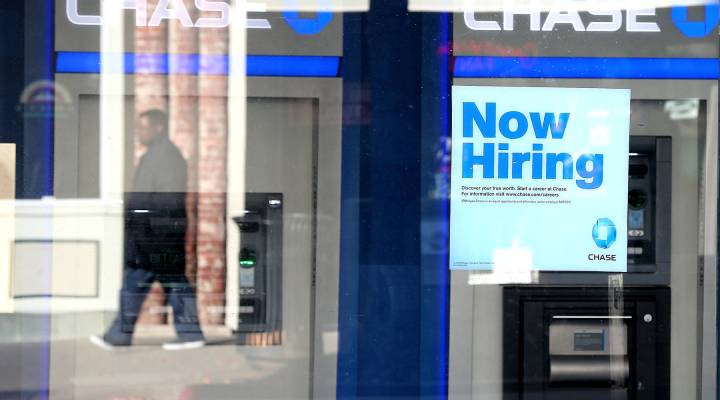
As some states cut back on unemployment benefits, are they less prepared for a recession?
As some states cut back on unemployment benefits, are they less prepared for a recession?

The number of people filing for unemployment insurance each week have been hitting lows not seen since the first moon landing in 1969. It means that the economy’s doing well and fewer people are getting laid off, but there’s something else going on.
One reason fewer people are filing for unemployment is because it’s gotten harder to file.
“It’s actually difficult, it’s just like other state agencies, it’s hard to get through,” explains Amber Geohaghan, a former state employee who lives in South Carolina. In 2013 the state legislature passed a sweeping overhaul of unemployment benefits, reducing the number of weeks people could be on unemployment, and the amount they could receive. “You know it’s tough, in South Carolina. The max is only $326 a week and obviously my bills keep going.”
Geohaghan hasn’t actually even started to receive any benefits yet. She’s locked in a battle with the state over whether she qualifies in the first place.
“States have been doing things to make it harder to get benefits in the first place, and doing things to make it harder to keep benefits once you have them,” said Michele Evermore, senior researcher at the National Employment Law Project. This trend started after the recession, when some unemployment insurance funds were run down. “There’s two ways to deal with a depleted insurance fund. One is just to fund the fund. The second thing is to cut benefits,” she said.
Some states have reduced the number of unemployment offices in favor of online portals that in some cases have proven dysfunctional. Nine states have reduced the length of time people can receive benefits to less than the standard 26 weeks, some, like North Carolina, went as low as just 12 weeks. South Carolina went to 20.
“We were very happy with the change in the length of time,” said Ben Homeyer, who directs the National Federation of Independent Businesses, South Carolina. “I mean you could be on unemployment for years and in a lot of cases we were concerned there was less incentive to come off of unemployment,” he said.
Businesses pay taxes to support the unemployment insurance fund. The NFIB lobbied to limit unemployment insurance in South Carolina and Homeyer said those taxes have come down as a result.
How many weeks of unemployment benefits are enough is debatable. “The approach that we’ve taken over the last 70 years is that 26 weeks is the right amount of time in non recessionary times,” said Jesse Rothstein, professor of public policy and economics at UC Berkeley. Longer when the economy goes south. Data shows that in today’s economy, even in good times, people are unemployed for longer than in decades past.
The results of tightening unemployment benefits, making them less accessible, show up in the national numbers. Back in 2007, 35% of unemployed workers were getting benefits. Today, only 27% are. Fewer unemployed workers are applying for unemployment to begin with. These changes mean those unlucky enough to be looking often don’t get as much help as they might have in the past.
“I talk with people who will call and say ‘I was turned down, I don’t have any savings, I’m gonna lose my home, where can I turn, where can I go?’” said Sue Berkowitz, director of the South Carolina Appleseed Legal Justice Center.
Some economists argue that limiting unemployment benefits and access to them now will pose a bigger problem in the future, during a recession when benefits are needed even more.
“What’s gonna happen is we’re gonna wait until there’s a recession and then people will see the program no longer provides counter recessionary benefits and people will see the magnitude of the problem they’ve created but it will be too late,” said Michele Evermore with the National Employment Law Project.
It’s possible that the federal government would step in were there another national recession, offer federal benefits, and pressure states to expand theirs. Vincent Reinhart is chief economist at the Bank of New York Mellon, he said this is likely. “I don’t particularly worry right now that states are cutting back asymmetrically because when the time comes they’ll get the nudge to put them back in place.”
UC Berkeley’s Jesse Rothstein isn’t so certain.
“In practice those take a while, several months after it’s really needed, and that was in times when the federal government was better able to pass legislation than it is now. So I think counting on Congress getting something done these days is not really a safe strategy,” said Rothstein.
Cutting back unemployment benefits in a strong economy has saved some states money. But when a new recession hits, that’s what some people are afraid of. The repercussions are unclear.
There’s a lot happening in the world. Through it all, Marketplace is here for you.
You rely on Marketplace to break down the world’s events and tell you how it affects you in a fact-based, approachable way. We rely on your financial support to keep making that possible.
Your donation today powers the independent journalism that you rely on. For just $5/month, you can help sustain Marketplace so we can keep reporting on the things that matter to you.


















